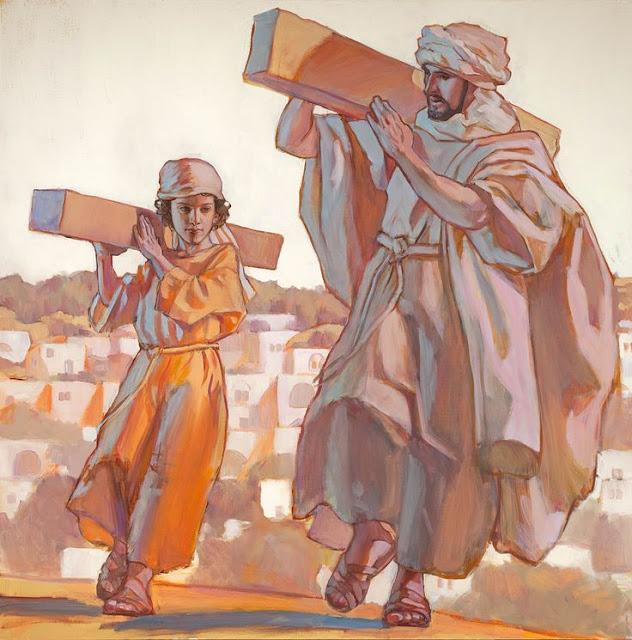The working class before Jesus was
born is composed farmers, fishermen, shepherds, domestic workers, among others.
There are more than two dozen other trades mentioned in Scripture, but there is
not enough space here to describe them all in detail.
Let us turn our lenses to St. Joseph
the Worker, the earthly father of Jesus. Joseph was craftsman or a builder
generally speaking. Actually, Isaiah earlier describes this work: The carpenter stretches a line, he marks it
out with a pencil; he fashions it with planes, and marks it with a compass; he
shapes it … He cuts down cedars; or he chooses a holm tree or an oak and lets
it grow strong among the trees of the forest; he plants a cedar and the rain
nourishes it (Isaiah 44:13-15). Joseph and Jesus, indeed, belong to the working
class of his time.
Lest we forget that May 1 marks the
international celebration of Labor Day and at the same time the whole Catholic
world honors the Feast Day of Saint Joseph, the Patron of all Workers and Patron
Saint of our hometown San Jose in Occidental Mindoro.
In 1955, Pope Pius XII instituted May
1 to be the Feast of Saint Joseph the Worker. This feast, which perhaps
intentionally coincided with “May Day” and “International Workers Day,” seeks
to remind us of the spiritual dimension of man’s daily work. In holding Saint
Joseph as the patron saint of workers, and in establishing this feast day, the
Church reminds the world of the sacredness of man’s labors, and of his dignity in
the workplace. But May 1 entails much more than just celebrating worker’s
rights. In choosing St. Joseph as the patron saint of workers, the Church
reminds the world of the sanctity of work.
There are also service workers during
the time of Joseph and they probably lived under the “no work, no pay” scheme
just like today. These are the people who earned their living doing services to
others. They are the water carriers, barbers, hairdressers. There were also
those known as fullers, who cleaned large quantities of clothing; they were
somewhat similar to the dry cleaners of today. In larger towns, there were
those who helped clean the streets, maintain the public baths, and repair
infrastructure. Larger towns had butchers, salters of fish and meat, and bakers.
Have you ever wondered what will be the scenario if a certain virus hit Galilee
those times and there was a lockdown?
Fast forward to 2020. The Department
of Labor and Employment (DOLE), mentioning data from the agency’s regional
offices, said around 2,073,362 workers have lost their jobs as of April 24. Of
this number, around 1.4 million were displaced due to temporary closures of
establishments, while over 600,000 personnel reported reduced incomes due to
modified working arrangements (fewer workdays, rotation, forced leave, and
telecommuting.) This is the one of the gloomy situations of labor this Labor
Day in the time of COVID-19 in the country.
Work or labor, according to Catholic
teachings is a wellspring of dignity. We are thought that there is no dignity
in living a life full of pleasure. In working, creating or building, men and
women participate in God’s own work.
Work is a pathway to holiness, as what
we Catholics believe, the doctrine of "no-work-no-pay" is a pathway
to hunger and hunger breeds evil. Though hunger cannot be an excuse for
lawlessness or terroristic acts, by his nature and instinct, a hungry man knows
no law. The employers must grant quarantine subsidy to their workers and the
government must order companies to provide such assistance. There is justice in
it and justice is a condition to peace.
In April 27, 2020, Dr. Anna Monina R. Bracamonte,
OIC-Chief of San Jose District Hospital (SJDH) announced that an asymptomatic
health worker of the hospital was listed as the fourth confirmed case of COVID-19
in Occidental Mindoro. A very sad news indeed. But we have to learn a lot from
this debacle. One must admit that this fight for survival requires safety and a
healthy labor force. Therefore, we have to start to bankroll, which was
neglected for decades, public investment in our health system ensuring its
ability to test and do what is required to protect our workers and the citizens in
general.
As a Josephite people, once we have
heard God’s voice in the cries and screams of the “salts of the earth” the
impoverished workers in our midst, we must rise from our deep slumber, get up
an act, as what Joseph have taught us.
With prayers and hope, let us
not forget that pandemics, from the 1918 Spanish flu to the H1N1 pandemic of
2009, do end. Sometimes with seemingly unbearable numbers of victims and
casualties, but eventually they do end. Hope this will end sooner along with
the capitalists’ “endo”.
Happy fiesta to all San Jose-born people here and all over the world and let us pray for his intercession...
But there will be a motorcade parading floats of
images of Christ, Mary and Joseph adorned with fresh flowers instead of the usual procession. This will be like a
lights and sounds show as announced by Mayor Muloy Festin and Cong. Nene Sato via "Para sa Bayan" program aired over DZYM last April 28 hosted by Daisy Leano and Helen De Guzman.
For the first time is history we will be celebrating fiesta this way. There shall still a prayerful, solemn and festive celebration of fiesta in the time of
pandemic. And please light a candle for the guidance of our patron saint and total human development and liberation for our workers.
Happy fiesta to all San Jose-born people here and all over the world and let us pray for his intercession...
----------
Photo and references:
https://www.akseas.net/feast-of-st-joseph-the-worker-may-1st/
http://blog.adw.org/2017/03/workers-trades-jesus-time/







No comments:
Post a Comment